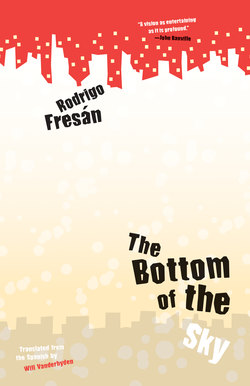Читать книгу Bottom of the Sky - Rodrigo Fresán - Страница 23
На сайте Литреса книга снята с продажи.
ОглавлениеI write this as if it were a science-fiction story suspended in space with little chance of ever coming home.
A science-fiction story that wants to be something else—speaking a language not of the genre—but can’t stop being what it is.
I can’t help it.
Dubious automatic reflex.
Something that is, I fear, more existential degeneration than occupational compulsion.
Entertainment of a writernaut, sitting, fixed to desk and chair.
Static centrifugal force but his face still deformed by the acceleration of paragraphs in whose lines nothing ages and everything seems new.
There’s a moment in any life (maybe the moments that we start to sense as our last moments, after looking at and not recognizing ourselves in the morning’s first reflection, because you always think of yourself as younger than you really are) when the past becomes something paradoxically futuristic.
So, as I’ve said, the act of remembering has something about it that’s as technologically inexplicable as any of those miracles of extraterrestrial cultures so advanced they end up unattainable.
And so, pretty soon, we find ourselves wondering what happened, what took place, what is truth and what is lie in everything we see again when we go back in time.
Memory is a reverse time machine that’s as powerful as—always moving forward or in multiple alternate directions—that other time machine: imagination.
And so—in the same way that all realist and contemporary novels would be science fiction for a reader in ancient times—the novel of our current and past existence, viewed mechanically and organized artificially, always strikes us as fantastical. Something that—to keep from getting depressed or feeling like a device on the verge of breaking down beyond all repair—we prefer to conceive of as happening in another galaxy. Foreign customs. Exotic vistas, often in black and white or sepia. Words whose meaning we don’t know. Cleaner air and a simpler life that, also, we like to think of as more civilized or at least more peaceful.
And—beyond certain fixed dates and common coordinates—this implies that each person’s past constitutes, in and of itself, a different world. And so, every time I went to one of those now-bygone conventions of science-fiction writers, someone would ask me a question that nobody asks anymore (because no one is interested in the answer to this question, it’s passed its expiration date): “Do you believe in the existence of intelligent life on other planets?” And I answer: “Yes of course, just look back and think about what was and reflect on everything that’s been. That’s also the explanation for why, inevitably, day after day, life is extinguished on several thousand other planets that are on this planet: people prefer not to remember and to not draw useful conclusions with respect to why it was that this or that catastrophe occurred. People prefer to live on a planet called Present without realizing that that is the planet whose civilizations have the briefest history and least posterity. People prefer not to think.”
I write this and I do so by hand, slowly, not trusting machines and knowing that none of these pages will degenerate into that supposed and rapidly failed novelty of electronic books. Knowing, as well, that its writing and its reading are already futuristic in their own right: when mankind hadn’t yet set in motion the mysteries of cables and keys, we were already functioning—and already reading and writing—on the basis of that internal and mysterious electricity leaping from neuron to neuron and bouncing off the more or less well-painted and well-appointed walls of the caverns of our brains.
I write exactly like this: outside time and space, weightless, beyond any communication from the control center.
I’m a solitary cosmonaut of my own life, lacking sufficient oxygen to return home, somewhat disturbed by what’s happening to me, but without that meaning that I’m upset that I don’t entirely understanding something that’s just happened.
Or that always has been and won’t stop happening.
The Incident and all of that.
I write this like a shipwrecked writer of messages in bottles, who casts them into the sea with the naïve hope that maybe she will find one of them. And that she’ll break it open and remove the glowing and sacred green crystals of these pages, and Tzimtzum, she’ll unfold them and read them. And I hope that she feels something like pity, or, maybe, a trace of tenderness, and that she comes back to me, not to love me, but—because I don’t believe there exists a more noble and sublime way of loving someone—to explain everything to me.
